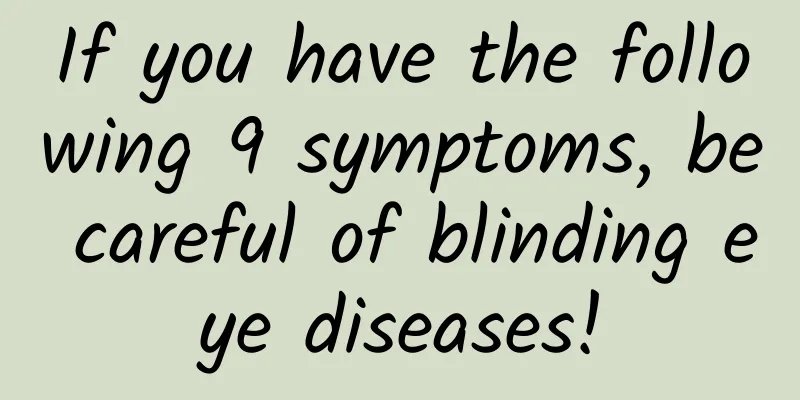H1N1 influenza is coming! Why is it so painful after being infected with H1N1 influenza? An authoritative expert tells you!

|
The transition from winter to spring every year is the peak season for respiratory diseases, especially influenza. Recently, influenza has been prevalent. According to the latest data from the Chinese Center for Disease Control and Prevention, the influenza virus positivity rate continues to rise, of which more than 99% are influenza A. Many people in the circle of friends have shared that they are taking medicine, getting intravenous drips... to relieve symptoms such as chills, aches, and weakness. Apparently, many people around them have been "infected." Li Shenglu, director of the comprehensive outpatient department and chief physician of Hunan Provincial Chest Hospital, reminds that if you have abnormal symptoms after being infected with influenza A, please seek medical attention immediately and receive treatment according to the doctor's instructions. Do not take any medicine on your own. "I felt muscle aches all over my body and couldn't sleep well. I woke up 5-6 times a night due to the pain," said Mr. Tang. A week ago, Mr. Tang, who lives in Yuelu District, had a slight cough. Unexpectedly, that night, Mr. Tang developed symptoms of cough, fever, fatigue, and body aches. The children and the elderly at home also developed symptoms of cough and fever. They took compound acetaminophen capsules, strong loquat dew and other medicines, but there was no improvement. A check-up at the hospital found that the influenza A virus antigen was weakly positive. Why is it so painful to be infected with influenza A? Is there any way to relieve it? Which pains should I seek medical attention for? 1. Why does it hurt so much after being infected with influenza A? "The common cold mainly presents respiratory symptoms, while the systemic symptoms are relatively mild. The systemic symptoms of influenza are more severe, including high fever, headache, muscle pain, etc." Director Li Shenglu said that influenza is a respiratory infectious disease caused by influenza viruses, which are divided into types A, B, C, and D. The influenza viruses that infect humans are mainly influenza A and influenza B. Influenza A is mainly transmitted through respiratory droplets, and can also be transmitted through contact with objects contaminated by the virus. Director Li Shenglu said that after being infected with influenza A, most people will experience obvious symptoms, the most typical of which is fever, which can reach 39-40 degrees Celsius. High fever often causes patients to feel chills and shiver. Some patients will experience systemic discomfort such as fatigue and loss of appetite, accompanied by respiratory symptoms such as cough, runny nose or nasal congestion, and digestive reactions such as nausea, vomiting and diarrhea. Regarding the body aches reported by many people after being infected with influenza A, Director Li Shenglu said that the muscle aches after being infected with influenza A are not mainly caused directly by the influenza A virus, but when the human body is infected with the virus, it will produce an immune response and release antibodies to attack the virus and prevent the virus from spreading further. When influenza A virus invades the human body, the immune system will recognize and respond. Immune cells are activated and release a variety of cytokines, which, while fighting the virus, may also affect nerve conduction and muscle function, leading to increased sensitivity of muscle sensory nerve endings, resulting in soreness. 2. Is there any way to relieve the pain caused by influenza A infection? Director Li Shenglu said that if body pain occurs after being infected with influenza A, you can speed up your body's metabolism by drinking more water, get more rest and avoid overwork. You can also take antipyretic and analgesic drugs such as ibuprofen, acetaminophen tablets, and nimesulide granules under the guidance of a doctor to relieve the pain. You can also use hot compresses, massage and other methods to assist in relieving the pain. For fever and headache caused by influenza A, you can take acetaminophen or ibuprofen, which can lower body temperature and relieve headaches. You can also take traditional Chinese medicine preparations such as Tianma Headache Tablets and Xifeng Tongluo Headache Tablets. At the same time, early use of neuraminidase inhibitor antiviral drugs such as oseltamivir can shorten the course of the disease, reduce the risk of disease progression and relieve symptoms. Other drugs such as Four Seasons Antiviral Oral Liquid and Isatis Root Granules also have certain antiviral effects. Physical methods such as cold compresses, massage, and acupuncture can also be used to relieve pain symptoms. Attention should be paid to high-risk groups such as infants, pregnant women, the elderly and patients with chronic diseases. They are at higher risk of serious complications, their condition may deteriorate rapidly, with a persistent high fever of over 39°C, and may develop acute respiratory distress syndrome (ARDS), sepsis, septic shock, heart failure, renal failure, and even multiple organ dysfunction. 3. After being infected with influenza A, which pains should require medical attention? "After being infected with influenza A, the more obvious symptoms are headache, chest pain, and joint pain. If these symptoms persist or worsen, you should go to the hospital for treatment in time." Director Li Shenglu introduced that the headache caused by influenza A is usually caused by upper respiratory tract infection and fever, and this type of headache may appear in the forehead or temporal area. Chest pain is usually concentrated behind the sternum or between the intercostal spaces of the chest muscles, accompanied by symptoms such as dyspnea and shortness of breath. Joint pain usually manifests as soreness, swelling and tingling in joints throughout the body, which may appear a few days after the onset of the disease, and the intensity and range gradually increase over time, sometimes accompanied by symptoms such as muscle pain, fatigue, and fever. "The H1N1 strain is not a new strain that appeared this year. At present, vaccination is the best way to prevent it." Director Li Shenglu reminded that wearing a mask, washing hands frequently, and taking good self-protection measures can largely avoid infection. Hunan Medical Chat Special Author: Yang Zhengqiang, Hunan Chest Hospital Follow @湖南医聊 to get more health science information! (Edited by Wx) |
<<: More than 99% of cases are influenza A! Urgent reminder →
>>: Things during pregnancy - Do you know what placenta previa is?
Recommend
Can dragon fish be raised together with other types of fish? How to feed dragon fish and fortune fish together?
As people's quality of life improves, more an...
How to pass gas after ectopic pregnancy surgery
The symptom of ectopic pregnancy is a manifestati...
How do we absorb calcium?
Does not liking to drink milk mean that you are c...
What can you eat to make your breasts bigger?
An enviable devilish figure that can attract peop...
Scientific weight loss: Eat right and you will lose weight
Do you think that you can lose weight just by die...
If you feel stomach discomfort and vomiting during pregnancy, this is how you can get quick relief!
During pregnancy, women's hormones change and...
Why does my uterus hurt when I urinate after a cesarean section?
After a cesarean section, a wound will be left on...
How to treat loose skin
I believe that everyone's skin is in the best...
Why do you need to hold your urine when taking color ultrasound?
It is very important for everyone to master some ...
Do I need to wear glasses all the time if I have astigmatism? How can I treat astigmatism besides surgery?
Astigmatism is a type of refractive error, which ...
What method is best for vaginal tightening?
Many women encounter some troubles during sexual ...
How to choose Nordic style furniture? What kind of furniture is suitable for Nordic style?
We all know that Nordic style is a popular decora...
Will removing the IUD damage the endometrium?
Removing the IUD may damage the endometrium and m...
Wash for vulvar itching
It is generally not recommended to use wash lotio...
Can I lose weight by sitting in confinement?
It is well known that female friends' bodies ...
![[Medical Q&A] Does a high-protein diet help muscle growth? What are the health risks?](/upload/images/67effc788fd07.webp)








